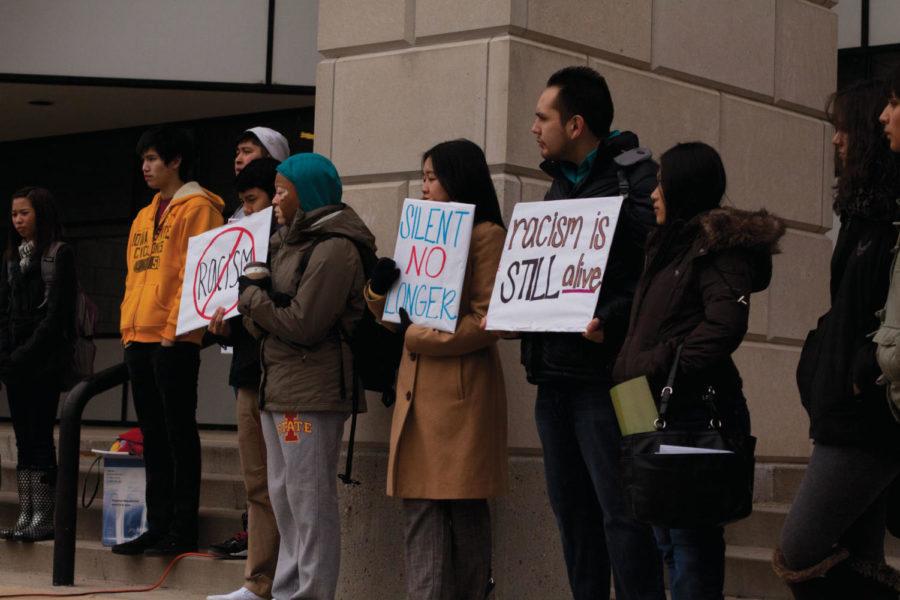Amollo: We need to talk about race, even when it has no immediate impact
Students come together to take a stand against the current racial controversies at Iowa State on Friday, March 2. Many students as well as some professors discussed personal stories of racism they have encountered. The rally was outside Parks Library in the free-speech zone.
March 5, 2012
Prejudice, n. A vagrant opinion without visible means of support. That’s a classic definition that American journalist Ambrose Gwinnett Bierce attached to the “ugly” word in a piece in 1906. At that time, the country was engulfed in racial prejudice in a manner that deeply bothered the conscience of those who had the balls to utter a word.
Today, racism may not be as vile as the yester-decades. Unlike those times, Americans today have an equal entitlement to the vote and even though far from parity, racial minorities have elected representatives at all levels of governance. Yet, that’s not the racial discrimination or racial bias that irks the ire of many. Racial stereotyping, instead, reigns supreme and so damning to the souls of those to whom the epithets and slurs are aimed.
Because the laws outlaw most forms of discrimination, the ugly face of racism plies its trade from a safety not easy to decipher. Today, it is safely camouflaged and buried in institutional practices that, while immoral, straddle legality to the latter. It is hidden in coded language that sometimes only comes off at the shopping mall, when seeking a place to live or while trying to catch a taxi — or painfully so, when dealing with law enforcement.
It is this careful coding of racism that has given credence to discrimination in places where it should be alien. University campuses, for instance, are the classic breeding grounds for less-echoed sentiments that seek to demean students of one race while elevating the “superiority” of the other. It is the irony of all things not held equal. It is the storied dilemma of how even though education and student ability are the common denominator with which the learners are judged, to fail to notice the difference in skin color, accent and some “cultural ways of living” considered out of step with the “modern cool” isn’t good enough. Education and the pursuit of success at college campuses seem to be finding its forced way under the bus.
Race and race relations are subjects that are feared in America, yet are subjects with ugly offshoots that go undeterred, whether in economics, politics, academic or social life. Like the plague, racism is something that everyone seems to be sworn to evade. There is an invisible collective nod that racism is lame, that racism is ugly, that racism is backward and highly self-demeaning to its victims — but, without the oomph and passion to address it. This is exactly what a petition signed by a group of students and faculty appearing in this paper as a letter to the editor sought to bring to the fore.
The letter “Racism remains alive, thriving at ISU” was a response to a tongue-in-cheek happy liner appearing in an earlier edition of the Daily’s “Just Sayin’” section. It sought to discount the careless insinuation at inferiority directed at Asian students by the author of the “lazy” liner. It also questioned our conscience as a community of scholarship and global citizens who have claimed our place on the conveyor belt of tolerance aimed at ideologically making the world a better place. The strongly worded letter called us out. It questioned America’s hate of racism while making a comfortable bed for it in all kinds of places.
A few things worth addressing, though.
One, the Daily editors, despite the accusation of advancing hate by publishing the stereotypical line, I would say, displayed great courage by opening a can of worms, which has thus attracted this kind of debate. Such opinions were not expressed by the Daily — but the newspaper has a duty to limit censorship and instead voice the concerns and opinion of the student body. If that student was inclined to slur a group of people, then my guess is that the Daily served them right to expose them. Now, we can talk about it.
Next, as a community, this incident demonstrates our comfort with racial prejudice until it comes so near to us. It is the body social of America. Racism is sacred, until the white school bus driver calls the black kid a “Negro.” Until someone makes fun of a “Latino accent,” we don’t have a problem with race. We cannot wait till the “white trashing” of a college friend. That is lame. Progressive thought and action demand constant engagement, even from those who are waiting to react in the ivory tower.
The ISU community, including the petitioners of the letter appearing in the Daily, must roll up their sleeves and take a leading role. We cannot be reactionary. And I speak as a minority who has some experiences to share. It hasn’t and will never be funny to be a victim of a racial slur.
Constant healthy conversations on race relations will set us free; we can’t raise the reactionary mantra when we remain that mother who tells her 3-year-old son to “be quiet” upon asking why the man in the grocery store is so dark.







